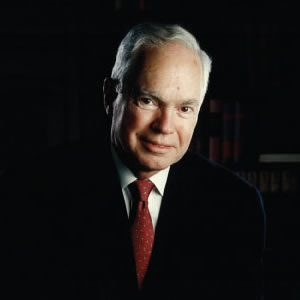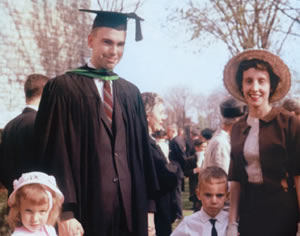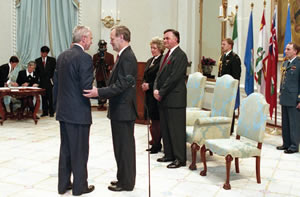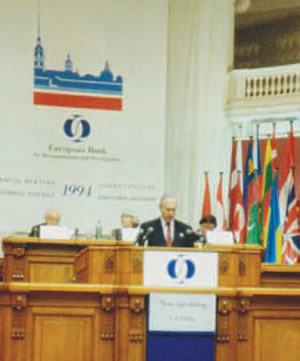Douglas Peters, BCom'63

Long before he began his career as Toronto-Dominion Bank’s Senior VP and Chief Economist, and even longer before his turn as Secretary of State under the Chrétien Liberals, Douglas Peters entered an employment office in Winnipeg. He confessed he had no education or experience and was told, “Well young man, there’s only one place for a man with no education and no skills to go, and that’s to work in a bank.” The Commerce’63 grad’s eyes gleam as he shares this story, punctuating it with a laugh. He took the advice and spent the next ten years in banking. One of the responsibilities of his first job was being in charge of “technology.” “That consisted of filling the inkwells and changing the nibs on the pens,” he jokes.
A transfer to a bank branch in Swift Current, SK, brought him into contact with a manager with whom he didn’t always see eye-to-eye. Douglas’s wife Audrey suggested the time was ripe for him to resume his education, as he had long planned. So, along with their two young children, they moved to Kingston and Douglas began his Commerce studies in 1960.
The Peters family lived frugally on approximately $3,600 a year, Douglas recalls. His one-time $1,000 Canada Student Loan as well as scholarships helped, while the balance came from summer jobs at a local bank that was happy to have such an experienced vacation replacement. Douglas remembers his undergrad years at Queen’s fondly and with typical wit, “I learned a healthy disrespect for numbers.”
His Commerce degree whetted his appetite for further study and the long-term marketability a graduate degree would provide. From numerous options, Douglas elected to pursue a doctorate at the Wharton School of the University of Pennsylvania. The competition at this world-renowned business school was fierce. “You always wonder whether your education from a small Canadian school is going to stand up to the test. I was competing with people from the very best small US colleges, and people from Harvard and Princeton. My Queen’s education held up very well. In fact, David Smith’s Economics course served me in good stead throughout my career.”
 The new grad and proud family at Queen’s Convocation Immediately after finishing at Wharton in 1966, Douglas was appointed Chief Economist at Toronto-Dominion Bank, where he would enjoy a 27-year career. He had also been offered a senior position with the Bank of Canada, but his public service would not begin until 24 years later, after he had retired from TD. Shortly before his 1993 retirement, in a speech to a group of bankers, Douglas was highly critical of the Mulroney Conservatives. He was later asked by a member of the Scarborough East Federal Liberal Association if he would consider becoming a Liberal candidate. Initially reluctant, his anticipated retirement beckoning, Douglas eventually agreed to run in that riding.
The new grad and proud family at Queen’s Convocation Immediately after finishing at Wharton in 1966, Douglas was appointed Chief Economist at Toronto-Dominion Bank, where he would enjoy a 27-year career. He had also been offered a senior position with the Bank of Canada, but his public service would not begin until 24 years later, after he had retired from TD. Shortly before his 1993 retirement, in a speech to a group of bankers, Douglas was highly critical of the Mulroney Conservatives. He was later asked by a member of the Scarborough East Federal Liberal Association if he would consider becoming a Liberal candidate. Initially reluctant, his anticipated retirement beckoning, Douglas eventually agreed to run in that riding.
During a gruelling 16-month campaign, (part of which was spent waiting for the Conservatives to call an election), he walked virtually every street in Scarborough East, knocking on more than 26,000 doors. In October 1993, his efforts paid off when he won his seat and became a member of the victorious Chrétien government. With typical humility, he reflects that “the real swings in elections seem to come from voting against, not for, a candidate or party. Despite all our hard work, and my recognition factor as a former high-profile banker, I feel people didn’t so much vote for me as vote against Brian Mulroney. They could have run a Liberal rabbit in Scarborough East and it would have been elected that year.” On a more serious note he adds: “In reality a great many people did vote for the Liberals, their policies and Mr. Chrétien. A few may have been influenced in their voting by me.”
 The 1993 Cabinet swearing-in ceremony Douglas decided a brief holiday in Bermuda with Audrey was required after the long and tiring campaign. “I was such a neophyte! Anybody who knows anything about politics knows that if there is the slightest chance of a cabinet post, you sit at home and wait for the phone to ring.” Upon returning from Bermuda, he found 13 voice mails most from Prime Minister elect Jean Chrétien and his staffers. He went immediately to Ottawa, where he was subjected to a rigorous interview process that culminated in his selection as Secretary of State for International Financial Institutions.
The 1993 Cabinet swearing-in ceremony Douglas decided a brief holiday in Bermuda with Audrey was required after the long and tiring campaign. “I was such a neophyte! Anybody who knows anything about politics knows that if there is the slightest chance of a cabinet post, you sit at home and wait for the phone to ring.” Upon returning from Bermuda, he found 13 voice mails most from Prime Minister elect Jean Chrétien and his staffers. He went immediately to Ottawa, where he was subjected to a rigorous interview process that culminated in his selection as Secretary of State for International Financial Institutions.
Douglas describes his subsequent life in politics as extremely demanding. “If my bosses at the bank had ever told me to work that hard, I’d have told them to shove it. But in my experience, elected representatives see their role as a public service, and feel they can add something to public life. They don’t go into politics looking to line their pockets.”
The stakes as a cabinet minister were high. “At the bank, I would be presented with a problem or a challenge, and then with a variety of options or strategies to approach it. Until you get into public life, you have no idea exactly how many options there are. There are so many wide-reaching ramifications to every decision! You’d think an economist would think in those terms, and of course I did, but even that experience was not sufficient to make me understand how broadly every aspect of government affects the lives of people.”
Asked what advice he might give to current Liberal leader Michael Ignatief, Douglas quips, “Get elected!” He feels that the Liberal Party needs to stimulate public interest by creating new and progressive policies, particularly with regard to environmental stewardship and job creation. If asked, he would advise Prime Minister Harper to be cautious about cutting back on stimulus efforts too soon.
“My Queen’s education held up very well,” says Douglas, comparing it to his Wharton PhD studies with classmates from Harvard and Princeton.
 Addressing the European Bank for Reconstruction and Development in St. Petersburg, Russia
Addressing the European Bank for Reconstruction and Development in St. Petersburg, Russia
An avid traveler who has visited more than 60 countries, Douglas volunteered with Canadian Executive Service Overseas (CESO) to help the central bank of Azerbaijan develop a deposit insurance system. In 2002, he spent a month in the capital city, Baku, under CESO’s auspices. “It was very interesting to be there as the country came out of Soviet rule,” he reminisces.
Douglas lost his beloved wife Audrey in August 2007 and continues to miss “the most important member of the family, who kept all of us going.” The family includes two other like-minded PhDs: daughter Catherine Gilchrist (London School of Economics) and fellow Queen’s graduate and son, David Peters (’91).
Though he’s approaching his 80th birthday, Douglas continues a writing career that began in his PhD days, currently for the Canadian Centre for Policy Alternatives, The Globe and Mail and Toronto Star. He still writes with long-time collaborator Arthur Donner, co-author of The Monetarist Counter-revolution: A Critique of Canadian Monetary Policy. He also consults and writes with his son, David. As for politics, “I go to fundraisers. That’s it!”
His advice to today’s Commerce students reflects his own philosophy. “Find work that you enjoy doing, find a group of people you enjoy working with, and don’t think you have to be wealthy by the age of 40 to be successful. If you are working with people you like in a job that you like, that’s the best reward you can expect.”
